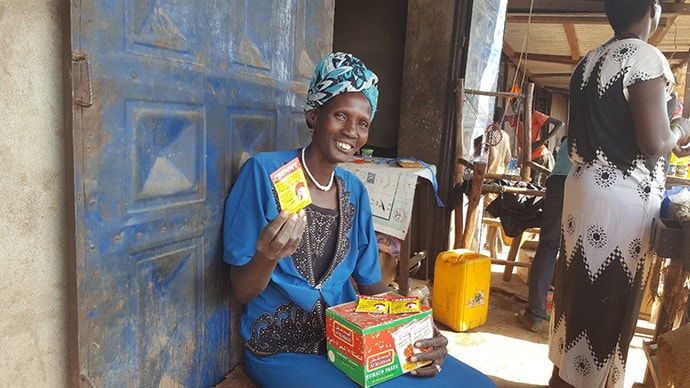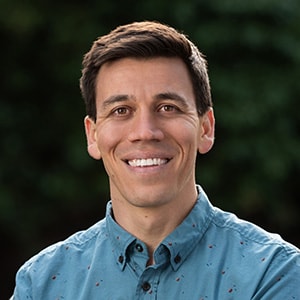Posted on September 29, 2021
By Cathy Herholdt, Senior Communications Director, World Concern

Photo credit World Concern. Abuk Lino at her shop.
When COVID-19 forced businesses to close and people to stay home in Kuajok, South Sudan, families had to spend their savings to survive. When things reopened, many were unable to restart their businesses.
But for widow and mother of four, Abuk Lino, her savings group enabled her to not only feed her family during the pandemic shutdowns, but to keep her small shop going after the village market reopened.
Continue Reading
Posted on September 22, 2021
By Mark Horosowski, MovingWorlds
With Kate Cochran, Upaya Social Ventures
 The United Nations General Assembly is this week, and quite frankly, I’m not looking forward to it. It’ll be another circuit of high level meetings and catchy headlines telling the world that we’re falling even further behind in our attempt to achieve the Sustainable Development Goals (sadly, we are… and corporations aren’t doing nearly enough).
The United Nations General Assembly is this week, and quite frankly, I’m not looking forward to it. It’ll be another circuit of high level meetings and catchy headlines telling the world that we’re falling even further behind in our attempt to achieve the Sustainable Development Goals (sadly, we are… and corporations aren’t doing nearly enough).
Governments will point fingers at each other and the private sector. The private sector will blame governments and consumers. Financiers like Blackrock will fund catchy PR campaigns that will distract us from the fact that they are creating the very issues they are claiming to be solving.
Pundits, “thought leaders”, and global executives will write compelling op-eds claiming that if only they were given more resources, they could solve all the problems. Then, as quickly as it came, the debates will pass and we’ll return to a state of normalcy, perhaps with just a little more frustration with our global policy makers and international institutions.
Continue Reading
Posted on August 24, 2021
By Laura Baerwolf, Director of Operations, Mona Foundation
The year 2020 will forever be associated with the COVID-19 pandemic. It brought the world to a halt in a matter of months, changed the way we live, work and play, and made clear that what impacts one impacts all. As of this writing, more than 4.4 million people have lost their lives to COVID-19, millions more have been pushed into extreme poverty, and millions of students are without access to continuing education.
“What started as a public health catastrophe became an economic crisis, a food crisis, a housing crisis, and an educational crisis … any of the gains made in the past 25 years across development indicators poverty, health, equality, and education — have been lost.”
— Melinda Gates, Co-chair, Bill and Melinda Gates Foundation
For Mona Foundation, a nonprofit that supports grassroots educational programs in economically disadvantaged communities around the world, 2020 began with great uncertainty and concern for the staff, students, and families of our partner organizations, many of which are based in areas where social distancing is impossible and access to healthcare is non-existent. But as we began to witness their resilience in mobilizing to face a devastating pandemic and their indomitable resolve to contribute to the social good, we were also uplifted, moved, and inspired. Our long-term partnerships, focused on building the capacity of local communities through the twin engines of education and gender equality, had prepared them to create all that was needed to sustain their trajectory towards a better future.
Continue Reading

 The United Nations General Assembly is this week, and quite frankly, I’m not looking forward to it. It’ll be another circuit of high level meetings and catchy headlines telling the world that we’re falling even further behind in our attempt to achieve the Sustainable Development Goals (sadly, we are… and
The United Nations General Assembly is this week, and quite frankly, I’m not looking forward to it. It’ll be another circuit of high level meetings and catchy headlines telling the world that we’re falling even further behind in our attempt to achieve the Sustainable Development Goals (sadly, we are… and